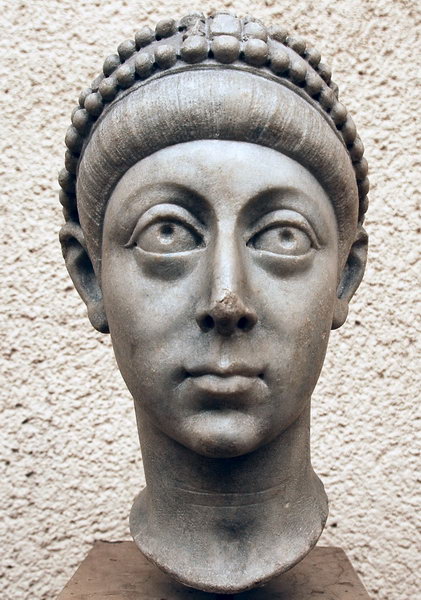Synesius, On Imperial Rule 21
 In his speech On Imperial Rule (or On Monarchy), Synesius of Cyrene offers some advise to the emperor Arcadius (r.395-408). More information about this speech, together with a brief summary, can be found here.
In his speech On Imperial Rule (or On Monarchy), Synesius of Cyrene offers some advise to the emperor Arcadius (r.395-408). More information about this speech, together with a brief summary, can be found here.
Throughout this speech, the word "Scythians" refers to the Tervingian Germans (who would later be known as Visigoths), whereas "king" refers to emperor.
The text is offered here in the translation by A. Fitzgerald. The four-digit numbers are page numbers of the Migne edition.
On Imperial Rule 21
[1] [1104] Now you will have to send out governors also to foreign parts, in so great an Empire as this. And the next step is to give the preference in your choice to those who administer with justice, for this kind of foresight is divine and magnificent. Now truly to seek to know each place, man, and dispute would need much detailed discourse, and not even Dionysius,note who had established himself as ruler of a single island, and not even the whole of that, would have been capable of this charge. But by the help of a few agents it is possible to care for the many. This has always been called a divine and universal solicitude which, though it is grounded in a strong character and does not stoop to haphazard details, nevertheless does not escape from them.
[2] God, in using this solicitude, does not Himself elaborate each of the details here below, but rather uses Nature as His right hand, remaining true to His own character, and is the cause of good works even to the last one of them, for He becomes the cause of causes. It is in this way that a king must inquire into the administration of the State. Let him distribute his rule as much as possible amongst the justest and best administrators.
[3] There is a reason for this, for he will become more easily intimate with a few than with many, and he will more easily notice the failures or successes of a few. Let his choice of those who are to rule be of the best, and not of the richest,note as it now is. We submit our bodies not to the richest physicians, [1105] but to those who are most skilful in their profession; and so the ruler shall be chosen who has most knowledge of ruling, rather than the rich man, since through him more things are likely to turn out for the worse than for the better.
[4] How, indeed, is it right that he should rule who, from the very evil of human nature, has accumulated wealth, and not the man who is poor, though he is just and law-abiding, and who, though the very fact that he is just, is not ashamed to dwell with poverty? But the other man who has become rich by hook or by crook, and has thereby purchased his office, could never know what manner of man a dispenser of justice might be.
[5] For it is evident, for example, that such a one would not easily hate injustice, or show a contempt for possessions, nor would he fail to make the magistrate's house a place of sale for decisions in the courts. It is little likely that he should look gold in the face with stern eyes, and pass on. On the contrary, he would regard it with veneration, surrender to it, and in the end embrace it; for he feels only gratitude towards it, inasmuch as he has taken administration in exchange for a measure of wealth, and has hired cities like any other commodity. He knows well that through this he is illustrious and sits in high places, looked up to by many other people, and by the just whether they be prosperous or poor.
[6] But achieve thou something to be envied for its virtue, even if it live with poverty. Let not a man's prudence escape you, nor the rest of that swarm of the soul's virtues which is concealed under a poor garb. Nay, drag him out in full view and demand that he make his virtue public, for it is not right that it should stay at home, but rather should it be in the field and engaged in battle. For know well that, whereas you will immediately herald them, it is you yourself who shall be extolled throughout, having furnished to succeeding time a pattern of a happy kingdom. And if you do this, you will quickly see many ashamed of the wealth their work has earned, and others taking pride in self-chosen poverty. Moreover, men's notions concerning it will change, so that to seek out wealth will be a reproach, and that the maintenance of poverty will be considered an honor.
[7] Of many gifts which God has bestowed on kingship, gifts enviable and happy, not the least, - nay, perhaps the greatest - is this, which all men should admire and praise, to wit, the power that the king holds over the soul of his subjects, and which enables him to change their opinion of his character, burnt in though it was by old habits and early indulgence, by showing that he honors its opposite and sets high value on it, for in whatsoever the king rejoices, this must at once increase and be adopted by the majority.note